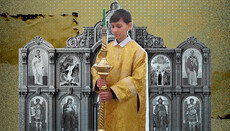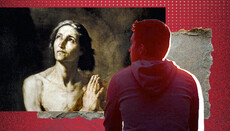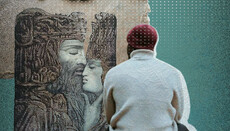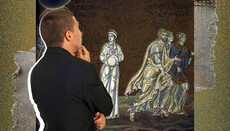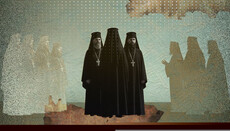Two very different Ivans: On John the Forerunner and Ivan Kupala
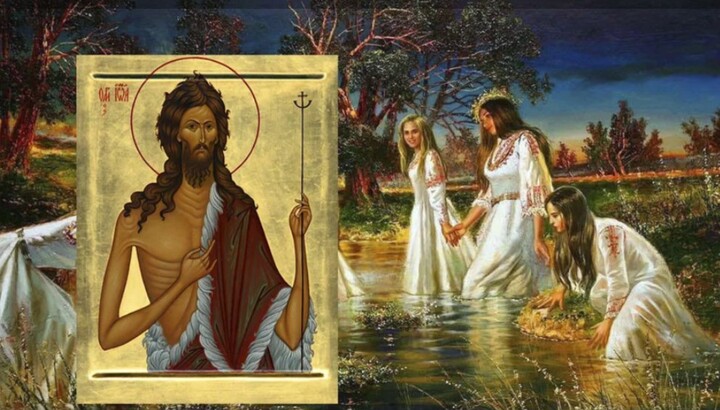
Sunday Sermon. On the difference between the Nativity of John the Forerunner and the holiday of Ivan Kupala.
The Nativity of the Holy Prophet, Forerunner, and Baptist of the Lord John is firmly associated in the popular mind with the holiday of Ivan Kupala. Back in my own very distant childhood, when summers weren’t nearly as hot as they are now, this day was considered the official opening of the swimming season. People believed the water had warmed up enough by then. The end of water fun was marked by the feast of the Prophet Elijah, who, in popular imagination, definitively “closed” all swimming. But on John’s Nativity, our screens overflow with images of cheerful round dances and blazing bonfires paying homage to the “good, merry customs of our ancestors.”
“But what’s so bad about that?” you might ask. “People go out, have some fun, jump over the fire. Who does that hurt?”
Those who jumped over the fire were people who bore the names of Orthodox saints. They were baptized in memory of people who chose to die a martyr’s death rather than renounce their faith. And unlike many modern Orthodox Christians, for them such a pagan ritual was not just a formality. The martyrs chose to sacrifice their lives rather than deny their faith in God, while many today thoughtlessly bind their souls to other beliefs by participating in pagan rites. The ease with which this happens means that the devil is filling the ranks of apostates without needing violence—just by tempting them with his tricks.
The Apostle Paul clearly divides people into those who serve God and those who give honor to the devil. “As you once offered your members as slaves to impurity” – that bore fruit – “for the end of those things is death.” “But now that you have been set free from sin and have become slaves to God, the fruit you get leads to sanctification and its end, eternal life.”
One of the essential elements of holiness is fidelity. The word holiness comes etymologically from the Hebrew kadosh – “set apart.” Holy is what is set apart from the rest of the world and dedicated to God. It lives for God, serves God, finds the entire meaning of its being in Him alone.
If someone thinks they can go and cheat on their spouse and then just carry on as if nothing happened, they’re wrong. The marital bond is already broken, whether the other spouse knows about the betrayal or not. Because everything we do matters, has meaning and consequences, even if we don’t fully understand it.
God demands from us unconditional faithfulness. You can’t hide betrayal from Him. “Jumped, had fun, danced in a circle... What betrayal is that?” This betrayal is called a pagan mystery, a communion with the pagan elements of the cosmos. This betrayal is a renewal of the ancient bond of humanity with the devil through pagan occult practices. Christ came to earth precisely to free us from that slavery.
The worship of the sun is the foundation of most pagan traditions. And in all solar religions, to “feed” the sun, human sacrifices were offered. The bonfire is a vehicle for sending the sacrifice up to heaven, and the one who jumps through it is the potential victim. That’s how they cast lots for the role of the sacrifice. They kept jumping until someone fell into the fire and began to burn alive. While the victim burned, people danced around the fire in a circle symbolizing the sun’s path, and after that, debauchery followed. This was a sacrifice to the god of fertility.
The day of Kupala was a day of legalized fornication. Generally, one can see that in many pagan cults there is a direct link between pain and sex, blood and fornication, murder and debauchery.
Even before Christianity, God considered actions like those performed on Ivan Kupala an abomination: “Those who consecrate and purify themselves to go into the gardens... all of them will perish,” says the Lord (Isaiah 66). “Did I not exhort you, like a father his sons and a mother her daughters and a nurse her children, that you should be My people and I should be your God, that you should be My sons and I your Father? I gathered you like a hen gathers her chicks under her wings. What shall I now do to you? I will turn you away from before My face.” (3 Ezra 1:30).
To some, all these round dances and bonfires seem like harmless fun, a merry game. But at the other end of that game lies the fiery Gehenna, and the bonfire burning as a pagan torch can become the eternal home for the souls of those who chose to play with the devil in this way.
Human beings are dual in nature. Physiologically, we are animals with all the types of energies characteristic of such creatures. But the pinnacle of our design reaches into the angelic realm. We are given freedom in the image of God, which connects us with the world of bodiless spirits. In this sense, humans can be considered a kind of angelic being.
Our difference from angels and demons is that our souls are still in the process of defining their stance toward the spiritual world. Earthly life is given to us precisely so that we can make our final choice.
If we are attentive to ourselves, we will see that, indeed, every day we offer our service either to God or to the spirit of darkness. If one were to look at a person through a scanner of the spiritual world, one would see that we are composed of energies that originate in our thoughts, feelings, and desires. Depending on the light of our thoughts and feelings, the entire person will shine with the same light. This energy shapes our goals, fills our existence with meaning, but above all, it forms the quality of our personality.
No thought can be neutral or indifferent. Each one is offered on one of two altars—either to God or to the devil. All our impurity, fornication, malice, hatred, greed, and pride feed the world of fallen spirits. They flock to such a soul like flies to a stench, absorbing what it radiates. Conversely, when a person lives by the commandments and keeps himself from sin, he radiates the grace and peace of the heavenly Kingdom.
Therefore, the most important thing for a person is to learn the culture of thought, to control what is happening inside our hearts. Every day is a brick, fired in the kiln of our thoughts, feelings, and desires, laid in the building of our eternity.
Then this building, as the Apostle Paul says, will be tested by fire. If it turns out that instead of clay it was built of straw, it will burn up. Straw is precisely the empty chaff with which we stuff our souls every day we live.
A Christian must learn the Art of Small Steps. Every micro-movement of our soul must be under the control of the Department of Spiritual Quality. No word should pass our lips until it has gone through that department.
We need an internal weather station that monitors the climate of the soul. If you sense a storm approaching, deep heart tremors of anger and irritation, clouds of rage gathering, you need to sound the alarm immediately, warning of the coming danger.
Likewise, there should be a geolocation service tracking whether we live in the “zone of walking before God.” If we forget Him, lose God from our inner coordinates, there should be a warning that the soul has gone off course and needs to find the right path.
That’s why the Apostle Paul warns us: “So then, be careful how you walk, not as unwise but as wise, making the best use of the time, because the days are evil.” (Ephesians 5:15).
